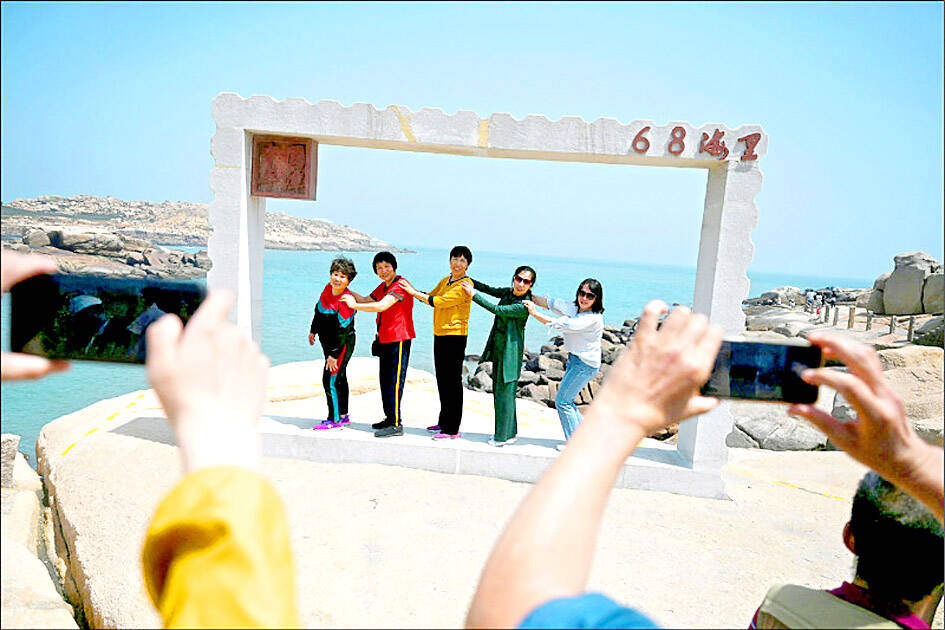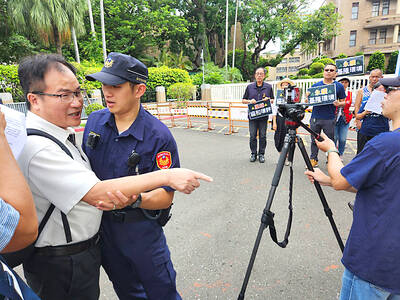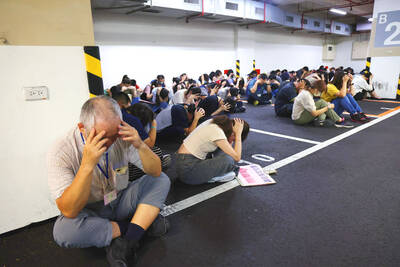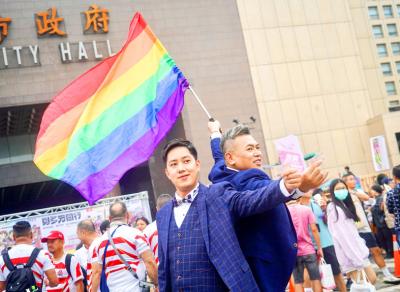Thirteen measures that China’s Fujian Province says would benefit Taiwanese appear to be part of an effort by Beijing to “localize” the Taiwan Strait by asserting that Taiwan is a province of China, an expert has said.
While a group of 17 Chinese Nationalist Party (KMT) lawmakers were visiting Beijing from Friday to Sunday last week, Fujian announced measures it said would benefit Taiwanese, including helping Taiwanese in China handle reimbursements of medical expenses under Taiwan’s National Health Insurance system.
Another of the measures was a “Fujian-Matsu City Pass” for residents of Lienchiang County (Matsu).

Photo: AFP
Tzeng Wei-feng (曾偉?), an assistant research fellow in National Chengchi University’s Institute of International Relations, said the moves reflected China’s efforts to localize the Taiwan Strait and claim that Taiwan is a province of China, only requiring coordination between provinces, not countries.
“I believe these measures will be somewhat appealing to residents of Kinmen County and Matsu ... but for residents on Taiwan proper, I think they will have less interest,” Tzeng said.
Beijing also announced measures it said would benefit Taiwan during the KMT delegation’s visit, including allowing tourists from Fujian once again to travel to Matsu, and resuming access to China’s market for some Taiwanese agricultural and fishery products.
Analysts have interpreted the measures as a move by Beijing to pressure president-elect William Lai (賴清德) ahead of his May 20 inauguration.
National Taiwan Normal University professor Huang Hsin-hao (黃信豪) said the measures could be seen as a signal to Lai, which might influence his inaugural speech to “not lean too much toward Taiwanese independence.”
China’s moves were also related to the situation in the Legislative Yuan where none of the two major parties hold an absolute majority, allowing Beijing some leeway to take a softer approach, said Huang, who specializes in Chinese Communist Party (CCP) politics.
Echoing Huang’s views was Chao Chun-shan (趙春山), an honorary professor with the Graduate Institute of China Studies at Tamkang University.
Chao said that Beijing has put pressure on Lai’s incoming administration by proposing measures and conveying messages with the aim of eliciting a response.
“Beijing hopes that Lai will provide a more positive and proactive response regarding cross-strait relations in his speech on May 20 ... and not mention phrases that could easily escalate hostilities between the two sides,” Chao said.
Beijing’s actions were also intended to demonstrate to the US its sincerity in improving relations across the Taiwan Strait, especially after US Secretary of State Antony Blinken’s visit to China from Wednesday to Friday last week, he said.
“The US hopes for dialogue between the two sides of the Taiwan Strait, and Beijing’s current message is that at least in terms of tourism and some other aspects, the two sides can have a discussion,” he added.
However, China also sent 12 military aircraft across the median line of the Taiwan Strait on Saturday last week, leaving many observers wondering why it would conduct military exercises while KMT lawmakers were in Beijing.
Tzeng said it was part of a two-pronged strategy of the CCP involving different chains of command in China’s Taiwan Affairs Office and the Chinese People’s Liberation Army.
If top CCP leaders, such as Chinese President Xi Jinping (習近平), perceive no substantial progress in cross-strait relations, they are unlikely to exert pressure on the Central Military Commission to cease military exercises around Taiwan, Tzeng said.

Environmental groups yesterday filed an appeal with the Executive Yuan, seeking to revoke the environmental impact assessment (EIA) conditionally approved in February for the Hsieh-ho Power Plant’s planned fourth liquefied natural gas (LNG) receiving station off the coast of Keelung. The appeal was filed jointly by the Protect Waimushan Seashore Action Group, the Wild at Heart Legal Defense Association and the Keelung City Taiwan Head Cultural Association, which together held a news conference outside the Executive Yuan in Taipei. Explaining the reasons for the appeal, Wang Hsing-chih (王醒之) of the Protect Waimushan Seashore Action Group said that the EIA failed to address

Taipei on Thursday held urban resilience air raid drills, with residents in one of the exercises’ three “key verification zones” reporting little to no difference compared with previous years, despite government pledges of stricter enforcement. Formerly known as the Wanan exercise, the air raid drills, which concluded yesterday, are now part of the “Urban Resilience Exercise,” which also incorporates the Minan disaster prevention and rescue exercise. In Taipei, the designated key verification zones — where the government said more stringent measures would be enforced — were Songshan (松山), Zhongshan (中山) and Zhongzheng (中正) districts. Air raid sirens sounded at 1:30pm, signaling the

The number of people who reported a same-sex spouse on their income tax increased 1.5-fold from 2020 to 2023, while the overall proportion of taxpayers reporting a spouse decreased by 4.4 percent from 2014 to 2023, Ministry of Finance data showed yesterday. The number of people reporting a spouse on their income tax trended upward from 2014 to 2019, the Department of Statistics said. However, the number decreased in 2020 and 2021, likely due to a drop in marriages during the COVID-19 pandemic and the income of some households falling below the taxable threshold, it said. The number of spousal tax filings rebounded

A saleswoman, surnamed Chen (陳), earlier this month was handed an 18-month prison term for embezzling more than 2,000 pairs of shoes while working at a department store in Tainan. The Tainan District Court convicted Chen of embezzlement in a ruling on July 7, sentencing her to prison for illegally profiting NT$7.32 million (US$248,929) at the expense of her employer. Chen was also given the opportunity to reach a financial settlement, but she declined. Chen was responsible for the sales counter of Nike shoes at Tainan’s Shinkong Mitsukoshi Zhongshan branch, where she had been employed since October 2019. She had previously worked